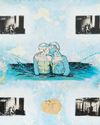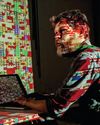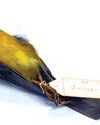
In his farsighted 2003 essay ‘The Work of Art in the Age of Biocybernetic Reproduction’, US academic W.J.T. Mitchell donned a critical hazmat suit to dissect a newly intrusive dynamic of capitalist extraction. Like Walter Benjamin’s 1935 essay, upon which its title fondly riffed, Mitchell’s text questioned ideas of ‘aura’ and ‘reproducibility’ but crucially redirected them towards a moment in which the codes of biological matter had been cracked, replicated and financialised. Here, reproduction was no longer tethered to representation but corporeally entwined with the reconstitution of living matter through techniques of genome sequencing, tissue cloning and gene editing. Given the lab-bound, cellular scale of these innovations, Mitchell wondered, how might the molecular evolutions of genomic capital be communicated in the public domain? What’s more, how could a work of art find discursive purchase in an age characterised by the very mutability of life, where each modified cell might itself be considered a living work of art?
Despite his spirited prognoses, Mitchell’s proposed examples were deader than dodos: cloyingly humanist works by Damien Hirst and Antony Gormley provided inert symbols of the human as an environmentally conditioned subject, but they did little to capture the vertiginous spirit of recombinant genetic data. Beyond the remit of studio-art practice however, Mitchell did sense the stirrings of a vital correlate for the biocybernetic era within the animated fantasies of popular culture. It’s one that we might, with hindsight, suggest illustrated a more fundamentally (and perhaps unsettlingly) productive relationship between life and image than any static assemblage of vitrines, pills or generously endowed body casts.
Esta historia es de la edición September 2023 de ArtReview.
Comience su prueba gratuita de Magzter GOLD de 7 días para acceder a miles de historias premium seleccionadas y a más de 9,000 revistas y periódicos.
Ya eres suscriptor ? Conectar
Esta historia es de la edición September 2023 de ArtReview.
Comience su prueba gratuita de Magzter GOLD de 7 días para acceder a miles de historias premium seleccionadas y a más de 9,000 revistas y periódicos.
Ya eres suscriptor? Conectar

"One day this boy..."
How David Wojnarowicz gave me life

Art Encounters Biennial My Rhino is Not a Myth: art science fictions
Various venues, Timişoara 19 May-16 July

Southern Discomfort
A series of upcoming biennials promise to explore the art of the 'Global South'. But what does that mean? And is the term of any practical use?

Casey Reas
Crypto has crashed and burned, but NFT visual culture is the better for it, and here's why, says the pioneering artist and programmer

Isabelle Frances McGuire
Through kitbashing and the hacking of readymades, an artist explores what digital visual culture might look like in material form

No pain, no gain?
What's primary about Matthew Barney's SECONDARY

Fine Young Cannibals
A spate of recent glitzy films have asked us to eat the rich. But what, asks Amber Husain, are we really swallowing?

Mutant Media
Animation and gaming design studios aren’t just for entertainment, claims Jamie Sutcliffe, they’re a geneticist’s lab for producing our spliced bio- cybernetic future

Midcareerism
What's an artist to do when no longer dewy and not yet long in the tooth? Martin Herbert surveys the options, none of them pretty

Diego Marcon
\"In general when I work, it's not like I'm looking for something and I find moles, it's more like moles find me, they pop up. I don't know why, I just try to remain open to these kinds of visit\"